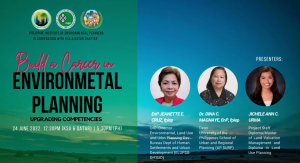
Envisioning a world where there are more licensed environmental planners to aid in mitigating adverse impacts of development projects in the environment and promoting sustainability, the Philippine Institute for Environmental Planners (PIEP) in cooperation with the Kingdom of Saudi Arabia and Qatar Chapters hosted a webinar entitled “Build a Career in Environmental Planning: Upgrading Competencies” on 24 June 2022. This event, which was conducted via Zoom and live streamed through Facebook, aimed to urge aspiring Environmental Planners (EnPs) to pursue formal education in land use planning and consequently obtain eligibility to take the EnP licensure examination.
EnP Jeanette E. Cruz, OIC-Director of Environmental, Land Use and Urban Planning Development Bureau Department of the Human Settlements and Urban Development (ELUPDB-DHSUD), shared in her message her personal story on how she was inspired by her background and experiences to take on a position in the government and eventually become a licensed environmental planner. EnP Cruz additionally discussed the possible career opportunities for licensed EnPs in the government and the nature of their work.
On the other hand, Dr. Dina C. Magnaye, who is also a licensed EnP, the former Program Chair of the Diploma in Land Use Planning (DLUP), and current Dean of the UP School of Urban and Regional Planning (UP SURP), presented the summary of their study on how open and distance learning provides equal opportunities to planning practitioners and other professionals.
Comparing the benefits of online learning against traditional learning systems, Dr. Magnaye iterated that the former promotes increased access and greater dimensions of openness and flexibility, greater dynamic culture of sharing and knowledge exchange, cost-effectiveness, balancing of inequalities between age groups, extension of geographical access to education, women empowerment, work-education-family life, and efficient training for key target groups.
“Learning is for all…. The opportunities to learn are vast in the midst of a global learning crisis. What we need are efficient learning infrastructure and system; adaptive learning technologies and approaches; flexible learning spaces and environment; knowledge-seeking learners; and well-motivated as well as committed learning support teachers,” Dr. Magnaye expressed as she concluded her presentation with a reflection on the necessity of openness and flexibility in education.
Meanwhile, Jichele Ann C. Urma, Program and Research Assistant at the University of the Philippines Open University, supplemented Dr. Magnaye’s presentation by providing the participants with a brief overview of the DLUP program.
One hundred fifty-three (153) individuals participated in the webinar – 72.5% of which are based in the Philippines and the 27.5% are based abroad. PIEP members who are graduates of the UPOU DLUP program were introduced, as well as those who are to graduate soon. Engr. Anselmo Alarilla, PIEP KSA Chapter member and current President of the UPOU Alumni Foundation, Inc. (UPOUAFI) – Faculty of Management and Development Studies (FMDS) Chapter, also shared some words of encouragement for the DLUP graduates and enrollees.
The webinar was emceed and moderated by Mr. Dennis Mota and Mr. Jack Canete, and graced by PIEP KSA President Ar./EnP Eldrid B. Refil and PIEP Qatar President EnP Mary Grace Hermosa-Pineda who gave their opening and closing remarks, respectively.
For more information about the DLUP Program, kindly visit this link.
Written by Jichele Ann Urma
Cross posted from the UPOU Faculty of Management and Development Studies Website








